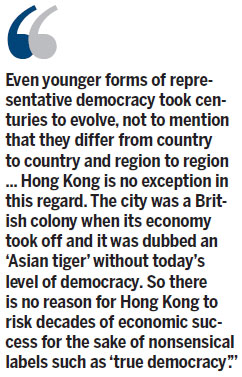Constitutional reform is a gradual process
Updated: 2014-07-22 05:53
By Yan Ming(HK Edition)
|
|||||||||
Zhang Dejiang, chairman of the National People's Congress Standing Committee (NPCSC), met with representatives of pro-establishment parties and social organizations in Shenzhen on Sunday. This was a day after Zhang met with Chief Executive (CE) Leung Chun-ying and the three-member Task Force on Constitutional Development. Both meetings focused on issues concerning Hong Kong's constitutional reforms.
Zhang emphasized that implementation of universal suffrage must be achieved in an orderly fashion appropriate for the situation in Hong Kong. He also reiterated the central government's commitment to support the SAR's constitutional development according to the Basic Law. He said Beijing would not tolerate attempts to blackmail it with the "Occupy Central" campaign.
Some people may misinterpret Zhang's words as a threat to put the brakes on Hong Kong's constitutional reform. But the truth is he explained no more than what has already been established in Article 45 of the Basic Law: "The method for selecting the Chief Executive shall be specified in the light of the actual situation in the Hong Kong Special Administrative Region and in accordance with the principle of gradual and orderly progress. The ultimate aim is the selection of the Chief Executive by universal suffrage upon nomination by a broadly representative nominating committee in accordance with democratic procedures." The key phrases are "gradual and orderly progress" and "democratic procedures".
These meetings came after CE Leung Chun-ying presented his report for NPCSC approval last Tuesday. This is in order to proceed with the necessary steps to prepare for selection of the CE by universal suffrage in 2017 according to the Basic Law and relevant decisions by the NPCSC. Leung's move is the first of five steps that must be taken before universal suffrage can be implemented in the 2017 CE election. The NPCSC is the highest institution of State power. It holds the exclusive right to provide the ultimate interpretation of the Basic Law.
Every step of Hong Kong's constitutional development must be approved by the NPCSC. That is how things work according to the nation's Constitution and the Basic Law.

Democracy has been evolving for centuries through the process of trial and error. Even younger forms of representative democracy took centuries to evolve, not to mention that they differ from country to country and region to region. These differences are the results of fine-tuning through generations of trial and error. Hong Kong is no exception in this regard. The territory was a British colony when its economy took off and it was dubbed an "Asian tiger" without today's level of democracy. So there is no reason for Hong Kong to risk decades of economic success for the sake of nonsensical labels such as "true democracy".
The opposition camp has accused the central government of backtracking on its promise of universal suffrage as well as the "high degree of autonomy" and "Hongkongers governing Hong Kong". These groundless accusations, aimed at deceiving the public, have become particularly pronounced since June when the State Council published its white paper on the practice of the "One Country, Two Systems" policy. Equally groundless are the references to "international standards" of universal suffrage and "public nomination". Instead of acknowledging reality and abiding by the law, the "pan-democrats" have resorted to denials, lies and illegal activities.
Since all else has failed they are now hoping "Occupy Central" will intimidate the central government into granting their unconstitutional demands for "public nomination". They want this as part of the method for selecting the CE by universal suffrage in 2017 while reducing the role of the Nominating Committee to a rubber stamp. This would be in violation of the Basic Law. Although some of these people are in the legal profession they show disregard for the rule of law because it stands in the way of them achieving more power. They need confusion to hide their personal agendas. This is why we must ensure constitutional reform proceeds according to the Basic Law and relevant decisions of the NPCSC. This requires orderly, gradual progress.
The author is a veteran current affairs commentator.
(HK Edition 07/22/2014 page9)